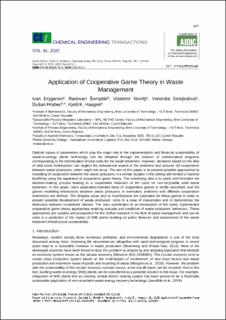| dc.contributor.author | Eryganov, Ivan | |
| dc.contributor.author | Šomplák, Radovan | |
| dc.contributor.author | Nevrly, Vlastimir | |
| dc.contributor.author | Smejkalová, Veronika | |
| dc.contributor.author | Hrabec, Dušan | |
| dc.contributor.author | Haugen, Kjetil K. | |
| dc.date.accessioned | 2023-10-11T07:45:35Z | |
| dc.date.available | 2023-10-11T07:45:35Z | |
| dc.date.created | 2020-08-25T08:42:30Z | |
| dc.date.issued | 2020 | |
| dc.identifier.citation | Chemical Engineering Transactions. 2020, 81, 877-882. | en_US |
| dc.identifier.issn | 1974-9791 | |
| dc.identifier.uri | https://hdl.handle.net/11250/3095687 | |
| dc.description.abstract | Optimal values of parameters which play the major role in the implementation and financial sustainability of waste-to-energy plants technology can be obtained through the solution of mathematical programs corresponding to the minimization of total costs for the waste treatment. However, decisions based on the idea of total costs minimization can neglect the behavioural aspect of the problems and assume full cooperation between waste producers, which might not occur. The aim of this paper is to present possible approaches to modelling of cooperation between the waste producers in a certain location in the setting with limited or banned landfilling using the apparatus of cooperative game theory. The underlying idea is to justify and formalize the decision-making process leading to a cooperative reduction of the costs for non-recyclable solid waste treatment. In this paper, each application-oriented class of cooperative games is briefly described, and the games modelling interactions between waste producers in exemplary problems with different cooperation restrictions are defined. The Shapley value and its modifications are calculated for these games in order to present possible development of waste producers’ costs in a case of cooperation and to demonstrate the distinction between considered classes. The main contribution is an introduction of the newly implemented cooperative game theory approaches enabling analysis and prediction of waste producers’ behaviour. These approaches are suitable and prospective for the further research in the field of waste management and can be used in a prediction of the impact of WtE plants building on public finances and assessment of the waste treatment infrastructure sustainability. | en_US |
| dc.language.iso | eng | en_US |
| dc.relation.uri | https://doi.org/10.3303/CET2081147 | |
| dc.title | Application of cooperative game theory in waste management | en_US |
| dc.type | Peer reviewed | en_US |
| dc.type | Journal article | en_US |
| dc.description.version | publishedVersion | en_US |
| dc.source.pagenumber | 877-882 | en_US |
| dc.source.volume | 81 | en_US |
| dc.source.journal | Chemical Engineering Transactions | en_US |
| dc.identifier.doi | 10.3303/CET2081147 | |
| dc.identifier.cristin | 1824914 | |
| cristin.ispublished | true | |
| cristin.fulltext | original | |
| cristin.qualitycode | 1 | |
